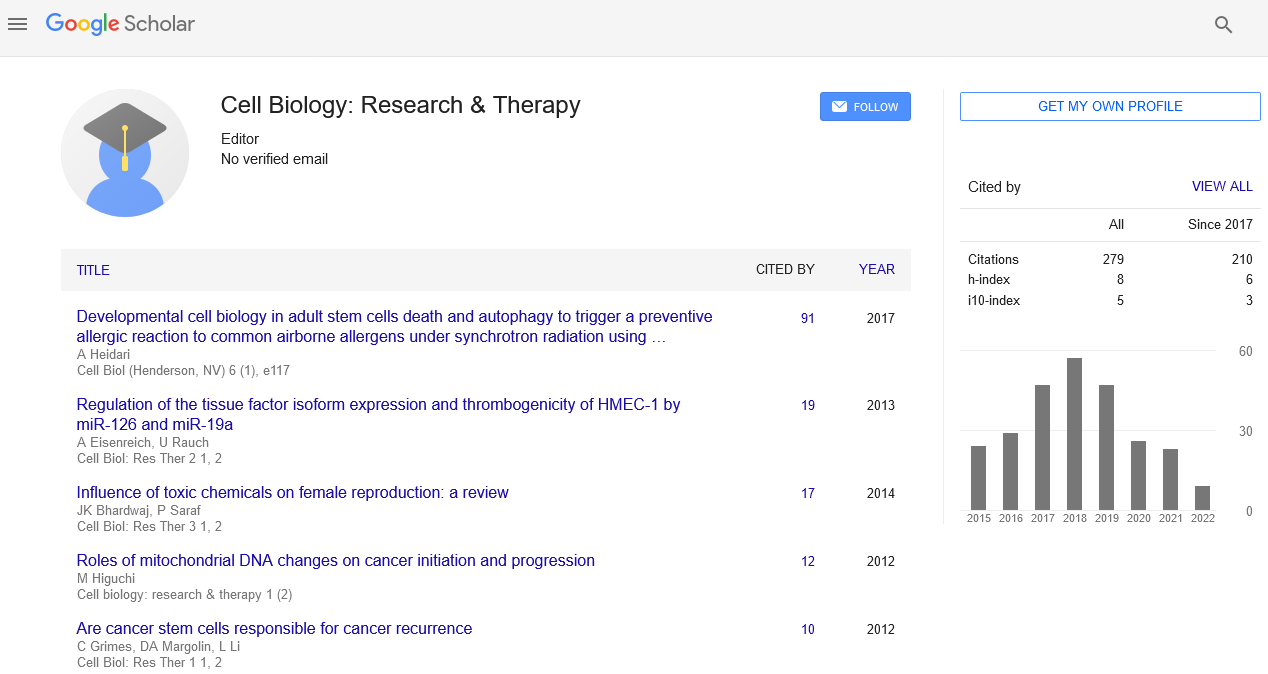Opinion Article, Cell Biol Vol: 12 Issue: 4
Cell Biology of Immunotherapy: Harnessing the Immune System for Disease Treatment
Jin Xun*
1Department of Cellular Medicine, Seoul National University, Seoul, South Korea
*Corresponding Author: Jin Xun,
Department of Cellular Medicine, Seoul National
University, Seoul, South Korea
E-mail: xunjin@gmail.com
Received date: 27 November, 2023, Manuscript No. CBRT-24-125276;
Editor assigned date: 29 November, 2023, Pre QC No. CBRT-24-125276 (PQ);
Reviewed date: 14 December, 2023, QC No. CBRT-24-125276;
Revised date: 21 December, 2023, Manuscript No. CBRT-24-125276 (R);
Published date: 29 December, 2023, DOI: 10.4172/2324-9293.1000192
Citation: Xun J (2023) Cell Biology of Immunotherapy: Harnessing the Immune System for Disease Treatment. Cell Biol 12:4.
Description
Immunotherapy has revolutionized the landscape of disease treatment by leveraging the inherent power of the immune system to target and eliminate abnormal cells. This study explores the cell biology underlying immunotherapy, shedding light on the intricate mechanisms by which immune cells are harnessed to combat diseases such as cancer. Understanding the cell biology of immunotherapy is crucial for developing effective and targeted treatments that modulate the immune response with precision. The immune system consists of two major components innate and adaptive immunity. Innate immunity provides immediate, non-specific defense mechanisms against pathogens, while adaptive immunity offers a more specific and longlasting response tailored to particular threats.
Key cell types involved in immunotherapy include T cells, B cells, Natural Killer (NK) cells, macrophages, and dendritic cells. Each of these cell types plays a unique role in the immune response, contributing to the recognition and elimination of abnormal cells. Cancer cells often evade the immune system by downregulating antigen presentation. Immunotherapy seeks to overcome this evasion by enhancing T cell recognition of tumor antigens. T cells, especially Cytotoxic T Lymphocytes (CTLs), recognize and eliminate cells displaying abnormal or cancer-specific antigens. Checkpoint inhibitors are a class of immunotherapies that target inhibitory pathways, such as PD-1/PD-L1 or CTLA-4, which dampen the immune response. By blocking these checkpoints, immunotherapy unleashes the full potential of T cells, enhancing their activity against cancer cells.
Adoptive cell therapies involve isolating, expanding, and reinfusing a patient's own immune cells. Chimeric Antigen Receptor (CAR) T cell therapy is a notable example where T cells are engineered to express receptors that specifically target cancer cells. This approach enhances the precision and effectiveness of the immune response. Autoimmune diseases arise from dysregulated immune responses, where the immune system mistakenly targets healthy cells. Immunomodulatory therapies aim to regulate or suppress specific aspects of the immune response to prevent damage to the body's own tissues. Monoclonal antibodies are used in immunotherapy to target specific molecules involved in autoimmune diseases. For example, anti-TNF antibodies are employed to treat conditions like rheumatoid arthritis by neutralizing inflammatory signals.
Vaccines harness the principles of immunotherapy to activate the adaptive immune system and generate immunological memory. They stimulate the production of antibodies and memory T cells, providing long-term protection against infectious diseases. Cancer vaccines aim to stimulate the immune system to recognize and attack cancer cells. These vaccines may include tumor-specific antigens or immunestimulating agents to boost anti-cancer immune responses. The complexity of the tumor microenvironment poses challenges for immunotherapy. Factors such as immune suppression and the presence of inhibitory molecules can hinder the effectiveness of immune cells within the tumor.
Achieving personalized immunotherapy requires identifying specific biomarkers that predict individual responses. Understanding the cellular and molecular profiles of patients and their tumors can guide the selection of optimal immunotherapeutic strategies. The future of immunotherapy lies in combination approaches that target multiple aspects of the immune response or combine immunotherapy with other treatment modalities. Combinations aim to enhance efficacy and overcome resistance.
Conclusion
The cell biology of immunotherapy underscores the intricate interplay between immune cells, their receptors, and the microenvironment in disease settings. Harnessing the immune system for disease treatment, whether in cancer, autoimmune diseases, or preventive measures through vaccines, requires a deep understanding of cellular processes. As research advances, unraveling the complexities of the immune response will continue to guide the development of innovative and personalized immunotherapies, heralding a new era in disease treatment that exploits the body's natural defenses for therapeutic benefit.
 Spanish
Spanish  Chinese
Chinese  Russian
Russian  German
German  French
French  Japanese
Japanese  Portuguese
Portuguese  Hindi
Hindi 